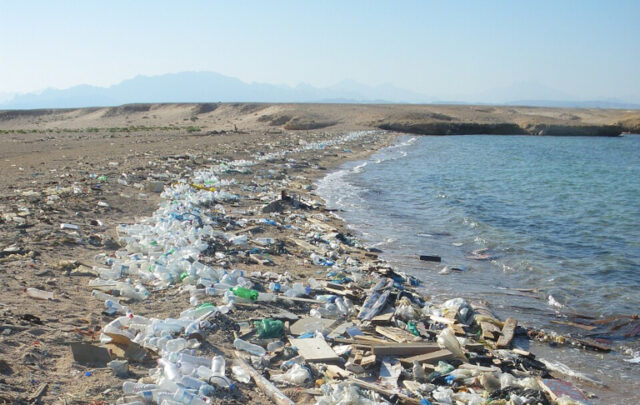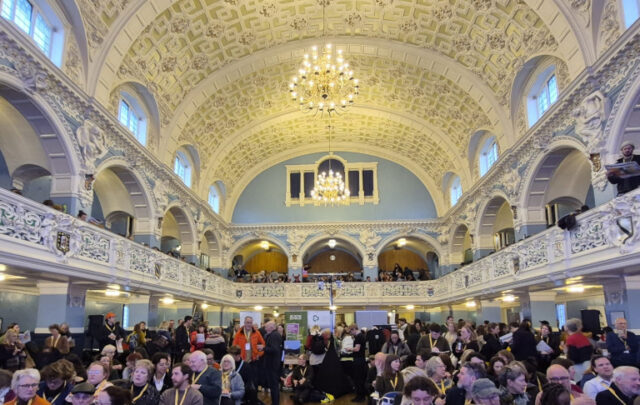
Aristotle tells us that humans are political animals. For Aristotle this characteristic seems to distinguish humans from other animals enough to provide a unique area of study that applies only to humans–hence Aristotle’s The Politics, a work which informs our political thinking to this day.
Political ecology, on the other hand, posits that while humans are political, the political process, of necessity, includes the natural world as a political actor. The human and the nonhuman are not distinct categories, but rather part of a seamless order that is (currently) best described by political ecology.
If the rhetoric of political ecology is to remain merely descriptive, we can stop here. But if we want that rhetoric to become a tool of change, we must go beyond the notion that “facts speak for themselves.” (We will get to the question of religion further on.)
The late Sen. Daniel Patrick Moynihan once said, "Everyone is entitled to his own opinion, but not to his own facts." We find ourselves now in an age where people believe that they are indeed entitled to their own facts. Many politicians and their supporters have come to believe that the facts provided by scientists are tainted by social, political and financial factors. In short, the politically-motivated critics of science have discovered the postmodern French critique of science.
These critics, particularly the American ones, would shrink in horror from the suggestion that they were engaging in anything remotely French in origin. Nor does this group extend the postmodern critique to other categories, such as the economic, social and religious views they promote.
The highly selective approach of focusing this critique on science, particularly the science of climate change, tells us something about its potency. No one wants to have the cannon (artillery) and canon (rules and principles) of the postmodernist critique aimed at their own vested interests. The metaphorical ramparts surrounding those interests might be blown to bits. It turns out that everything we do and think is shot through with social, political, financial and, yes, even religious content.
So, it is telling that part of the attack on the science of climate change has come in the form of religious rhetoric. An Illinois congressman vying for the chairmanship of the U.S. House of Representatives’ Energy and Commerce Committee in 2010 declared that God simply won’t let climate change create floods and other effects that will undermine human civilization. His colleague, U.S. Sen. James Inhofe, invoked similar ideas in his book The Greatest Hoax.
Such attacks have been potent because environmentalism does, in fact, share many characteristics with religion. And, it turns out that many of environmentalism’s adherents work to address environmental challenges out of a conviction that it is their religious duty to do so as stewards of God’s Earth. Environmentalism is not a branch of science then, but a movement based on values. And, the key value is that human culture should continue indefinitely into the future.
The main difference between environmentalism and those opposing it is that environmentalists believe human continuity can only be secured by respecting the limits and dictates of the natural world. Some environmentalists go further and assert the inherent right of other species, both animal and plant, to exist and thrive and not simply to be food and fiber for humans.
The idea that environmentalism is a religion is sometimes hurled at its adherents as a criticism for two reasons. First, environmentalism is presumed to compete with "genuine" religions in part because it appropriates religious terms and imagery. Second, asserting environmentalism’s status as a religion is somehow thought to diminish the scientific findings behind the claims of environmentalists. Environmentalism, in this case, is styled as "just a religion."
While it might seem tempting to downplay the nexus between religion and environmentalism in order to bolster environmentalism’s scientific underpinnings, I think this would be a mistake. The battle is now on for which worldview will prevail in the halls of government and in homes and businesses around the globe–a view that ignores environmental concerns and warnings or one that seeks to address them.
The effectiveness of religious rhetoric suggests that environmentalists ought not to discard it, but rather figure out how to harness it even more effectively. Environmentalism is, in fact, now emerging as a nonsectarian religious movement embraced by congregants as different in their religious beliefs as Pope Francis, the Creation Care movement of evangelical Christians, Jewish environmental activists, the Dalai Lama, and Islamic leaders and clerics.
The nonsectarian nature of environmentalism is the key to harnessing what religious rhetoric and imagery have to offer the environmental movement without attaching it to any specific religion. Religion speaks to the heart, to the life of feeling, and it speaks to it probably more deeply than any other cultural institution. The feeling life ultimately is the wellspring of action, and we need action more urgently than ever.
There is no moral imperative for the continuity of human culture in the sciences of biology, chemistry or physics. Yes, biology speaks to the human instinct for procreation and survival. But it does not conclude that humans ought to continue as a species. The basic sciences are meant by definition to be descriptive endeavors, not prescriptive ones.
Dare environmentalists venture beyond the seeming comfort of the secular scientific findings that have convinced them it is time to act? Many already have and to good effect. Dare environmentalists speak on behalf of "the facts" in ways that appeal to our deepest feelings? They have and they must if they are going to win over enough people to force sufficient change in both policy and daily practice.
Language, imagery and symbols are the main tools for coordinating human action. Political ecology as a field of study has created a scaffolding upon which the words, phrases, images and symbols needed to invite action can be displayed for all to see. We should not be afraid to add religious words, phrases and imagery so long as we carefully take notice of our audience and do not invite sectarian strife into our conversations.
All of the foregoing should be viewed as more of an investigation than a conclusion. I have much more thinking to do about how to make the rhetoric of political ecology more effective. This essay is meant to be as much an invitation to conversation as it is an argument–for a new rhetoric of political ecology will be created by all of us experimenting together.
Image: Used to illustrate a wikibook (on the Wikibooks of portuguese language: " Experiência religosa "). Made with other images from Wikimedia Commons. Via Wikimedia Commons.
1 – The characteristics of the brain (eg: intelligence, emotional situation, etc.) 1.2 – The cultural background of the subject (eg: religous beliefs, world view,etc.) 2 – The technique used to have a religious experience (eg: Meditation, Praying, Chanting, etc.) 3 – Substance or equipament used to have a religious experience (eg: Entheogens, stimulation of the brain with magnetic fields,etc. ) (picture used : a Dimethyltryptamine chemical compound) 4 – A particular religious experience 5 – Permanent changes in the brain after the religious experience (eg: changes in moral values, changes in religious views, changes in the meaning of life, etc.) 5.1 – Descriptions of a religious experience (eg: writing of description of religious experiences, or description passed through talking) 5.2 – Point of view of the religious experience the subject had (eg: "It was a divine encounter!", "I had a union with god", "It was a encounter with Jesus", etc.)
























